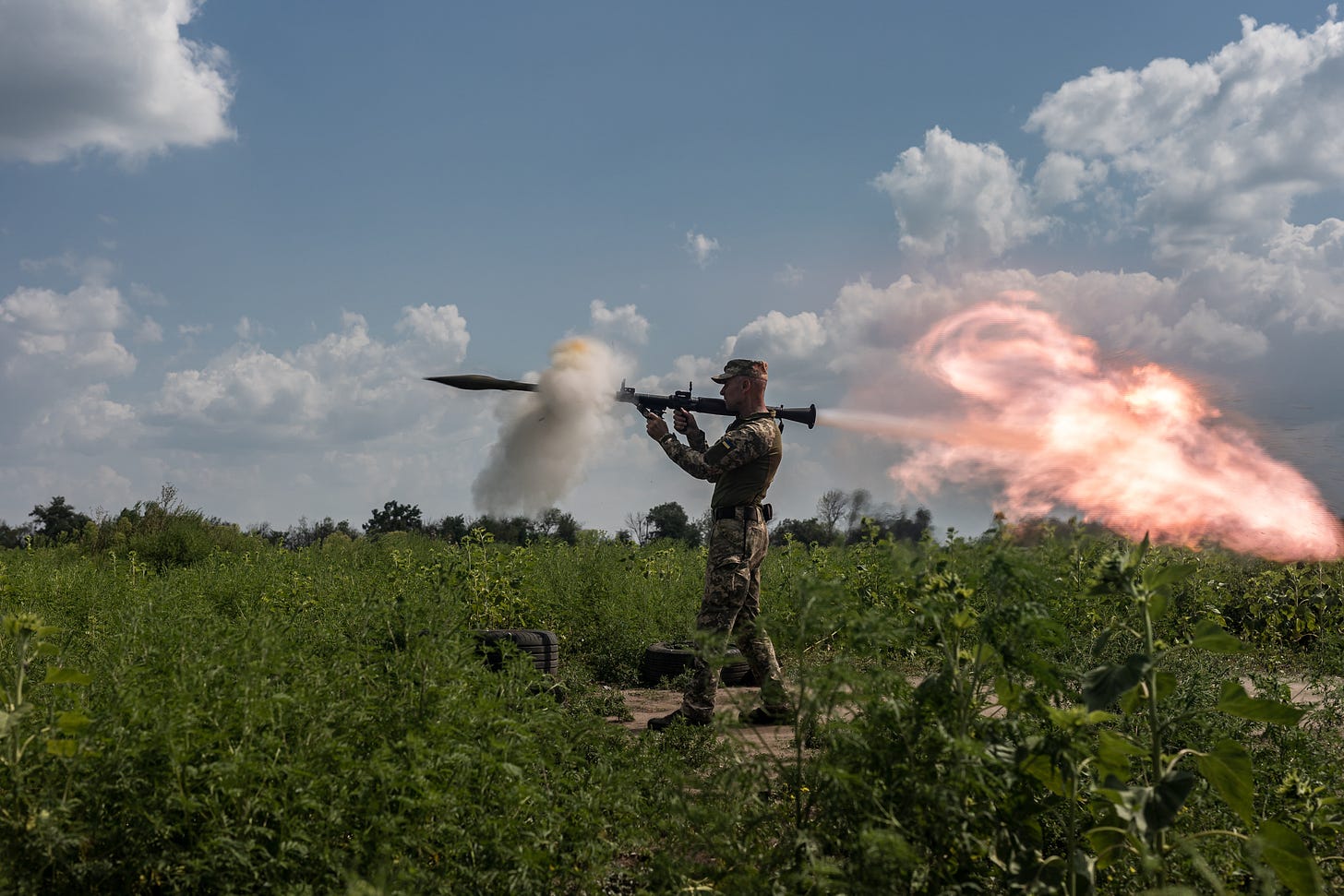Ukraine Doesn’t Need Armchair Generals
Anonymous comments by Biden administration officials criticizing the Ukrainian armed forces don’t help anyone.

“Whereof one cannot speak, thereof one must be silent.”
—Ludwig Wittgentstein
IN WHAT BEARS ALL THE HALLMARKS of a concerted campaign of planted stories in the press, anonymous Biden administration officials have been talking down the ongoing Ukrainian counteroffensive against Russian occupying forces. The judgments of these unspecified senior officials have been, in some cases, supported on the record by a bevy of nongovernmental experts whose own predictions in this war have been, simply put, wrong. The stories, which appeared in the Washington Post, the New York Times, and the Financial Times, all emphasize different points but reach the same conclusions:
the counter-offensive is failing;
the Ukrainians are disregarding advice from United States, United Kingdom, and other allied military officials;
they are not fighting the campaign as NATO allies have urged them to do, having eschewed the U.S. preference for decisive maneuver operations in favor of smaller unit actions supported by efforts to attrit Russian forces in hopes of breaking through at some point in the future;
the Ukrainian leadership is too sensitive to casualties;
they have misallocated their forces by continuing to contest Russian gains in the east, particularly in Bakhmut; and
the war is now locked in a dead-end stalemate, with an implicit suggestion that a ceasefire along the current lines is the best option.
The Washington Post reported without comment unhelpful and irresponsible remarks by unnamed administration officials: “U.S. officials reject criticisms that F-16 fighter jets or longer-range missile systems such as ATACMS would have resulted in a different outcome. ‘The problem remains piercing Russia’s main defensive line, and there’s no evidence these systems would’ve been a panacea,’ a senior administration official said.” There is no such thing as a panacea in warfare—nor in any other human endeavor, for that matter. The administration official is dodging the question of whether fighter jets and longer-range artillery would have materially helped the Ukrainians, almost certainly because the official is too embarrassed to admit that they would have.
The criticisms reported by the New York Times were even more confusing and less coherent. A series of nameless American officials faulted the Ukrainians for using the wrong tactics at the wrong times in the wrong places with the wrong conversations. But when Chairman of the Joint Chiefs of Staff Mark Milley, his British counterpart, and the top U.S. commander in Europe all “urged Ukraine’s most senior military commander, Gen. Valeriy Zaluzhnyi, to focus on one main front . . . according to two officials briefed on the call, General Zaluzhnyi agreed.”
Perhaps most frustrating was the Financial Times’s reporting, which relied heavily on the analysis of RAND’s Samuel Charap to explain the views of yet more—or perhaps the same—U.S. officials. Charap has been one of the most reliably unreliable analysts of the war. Before the war, he argued that the Ukrainians stood no chance of stopping the Russian Army even with Western weapons. Later, between the astonishing liberation of Kharkiv and the equally impressive liberation of Kherson last fall, Charap suggested that a diplomatic settlement between the United States and Russia to end the war would be preferable to Ukrainian victory. He is therefore a poor choice to explain the war, and an even poorer choice to add context for the opinions and assessments of U.S. officials with whose policies he disagrees.
British military historian Lawrence Freedman has done an excellent job of putting these “criticisms” in context. Specifically, he notes that it was never likely that the Ukrainians would be able to make sweeping gains against deeply entrenched Russian defenses built up over many months—a situation which could have been avoided or mitigated if the United States and other allies had equipped Ukraine for deep strike and air superiority in a timely manner. Freedman points out that American critics have never themselves engaged in this type of warfare, and the United States would never attempt the kinds of operations these faultfinders advocate without massive air superiority, which the Ukrainians lack thanks to the administration’s persistent refusal to give them the means to achieve it. Finally, Freedman rightly observes that it is premature to reach a judgment on the outcome at this point.
Moreover, the attention that these stories generated forced National Security Advisor Jake Sullivan to state publicly that the administration does not assess that the conflict is stalemated. He effectively seconded the judgment that Freedman, the analysts at the Institute for the Study of War, and others have reached: that it is too early to make definitive statements about the relative success or failure of the Ukrainian armed forces. It should go without saying at this point that anonymous sniping at the Ukrainians in the press and literal armchair generalship, echoing to a drumbeat of defeatism that has extended throughout the course of the war, ill becomes an administration that has been slow to supply the Ukrainians with the wherewithal to conduct the very kind of operations that it now demands that the victims of aggression undertake at their peril.
But these stories aren’t mere matters of chutzpah and bad taste. They are disastrous examples of the administration’s seeming inability to understand the information environment in which the war is taking place and the requirements for sustaining public support for U.S. engagement and commitment over the long haul.
The gravamen of the stories will undoubtedly undermine support in Congress for the supplemental funding that the administration is seeking in an already parlous legislative environment. Members from both parties are balking at approving additional support for the Ukrainians. The administration has now provided the opponents with their talking points—why throw good money after bad if the counteroffensive is failing?
These stories will reinforce the narrative articulated by critics like Tucker Carlson and the isolationists clustered around the Quincy Institute that the Ukrainians have lost the war, that there is no prospect of success, and that we are headed to yet another “endless war” supported by the globalists and the merchants of death in the military-industrial complex.
The emphasis on the Ukrainian high command’s sensitivity to casualties in particular would seem to validate a main message of Russian propaganda: the U.S. is willing to fight to the last Ukrainian.
The ultimate damage, however, will be to the support of the American people for the noble mission of helping an independent people resist unprovoked authoritarian aggression. Americans have shown pretty robust support for Ukraine’s fight for freedom, which is important not only for the Ukrainian people but for NATO (to demonstrate to Putin that twentieth-century-style land grabs are unacceptable), to the American people (to demonstrate that in our-interconnected world unchecked aggression against our allies inevitably affects our own security), and to show Xi Jinping and Kim Jong-un that we will resist their efforts to dominate their neighbors. Americans’ support for Ukraine is especially commendable considering the fact that President Biden has never made the public case for his own policy in a primetime Oval Office address or anything other than on-the-run comments to the media. This dereliction of presidential duty is becoming more glaring as time goes on.
Where the administration should be clear and loud, in the voice of the president from the seat of executive power, it has been silent. Where the administration should be silent, in anonymous whispers of doubt and criticism for allies, it has been logorrheic.
The only people who will be heartened by the verbal incontinence of this administration will be those in Moscow, Beijing, and other quarters who wish the United States ill. They are likely to conclude that no matter what the stakes, the Biden administration lack—or, more dangerously, the American people lack—the stomach for a protracted conflict. As history has demonstrated time and again, adversaries’ perceptions of American weakness inevitably invite attacks on our vital interests.







